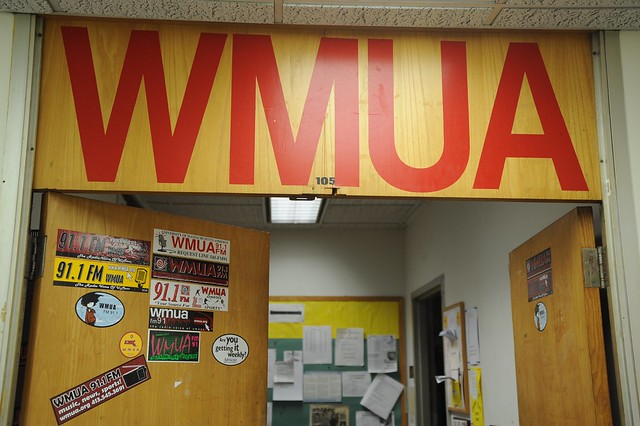After a 33 percent budget slash to RSO and agency funding by the University of Massachusetts Student Government Association last semester, student organizations have felt the effects of losing a significant amount of money.
WMUA, the University’s sole radio broadcast station, was one of many affected — over the years, their budget has dramatically shrunk, dropping from $140,000 to $73,000;
They requested a budget of $97,000, receiving only $73,000 for the 2019-2020 year. The year before, the general manager requested $180,000 and received $140,000.
The station was initially told that their budget would be cut to $60,000, but later received a $13,000 refund following the cuts, totaling the $73,000. The radio station is able to continue broadcasting to students, however the budget cut puts the station and its members in a precarious situation.
“If we put all of the money we got toward payroll and not toward equipment, we still wouldn’t have what we need for payroll [had we not received the refund],” said Andrew Cunningham, last year’s general manager of WMUA, in an interview with the Collegian in April. “We had less needs this year, but we made a big point to ask for the necessities.”
From costly equipment to payroll expenses, WMUA must spend money to keep the 71-year-old radio station running.
The station has 14 paid positions, each one integral to the daily operations. Many members of the staff work more hours than they log, with Cunningham himself having worked over double his weekly 14 paid hours. Payroll is WMUA’s largest expense.
“Some students couldn’t work these jobs if they weren’t paid because they use the money for rent,” he said. “If they didn’t have it, they would have to work another job.”
“We would definitely still be able to run [if the budget is reduced in the future], but … everyone would have to take reduced hours,” said Toby Cashook, WMUA’s general manager this year. “The issue with that is that most of our staff members are working second jobs, so it would take priority away from the radio station.”
Had they been cut 33 percent along with additional cuts, the radio station would have had to merge two positions and cut the hours of multiple others.
The budget also covers equipment in case of failures, which can lead to fines from the FCC of up to $25,000, Cunningham added.
“Some of our equipment costs upwards of $30,000, and that’s just what we have to deal with in order to keep a properly running station,” Cashook said.
Although the current SGA administration may initially seem to blame, the issue has little to do with those in office now. Past administrations didn’t plan for inflation or raise fees, according to Amelia Marceau, the chair of the Ways and Means Committee of the SGA, who confirmed the cuts to RSO funding. She added that the SGA’s bylaws make it difficult to raise the Student Activities Fee to offset the difference.
“There’s just not enough money in the SATF [Student Affairs Trust-Fund] to be sustainable for the 200-plus groups that we have on campus,” said Marceau. “So, the cuts were made so that we could fund groups at what we could fund them instead of underfunding and just completely zeroing all of them.”
All of the cuts came around the time that the SGA raised the Student Activities Fee by $17.32 annually, the first time they’d done so in the past four years. Multiple RSOs voiced their support for the move, saying that their organizations would be unstable had they not received a return following the cuts, including WMUA.
However, RSOs still had to worry about the budget slash on top of basic budget reductions that would have happened regardless of the 33 percent cuts. Some organizations were put in a much more fragile position, with their future existence coming into question.
“Fortunately, we’re a sturdy organization and will survive off of the bare necessities, especially with the 17 percent refund,” Cunningham said. “That’s huge for us and covers all of our payroll, and all the necessities for the equipment line. We’ll be able to get by. We aren’t going to crumble.”
Matt Berg can be reached at [email protected].





















Josh McCawley • Sep 19, 2019 at 11:26 am
The unfortunate truth is that the SGA and University as a whole do not fully understand the funding requirements that come with running a 24 hour/365 day a year radio station. This isn’t an experiment that can be allowed to fail- this is a licensed entity that has to follow legal FCC requirements and needs to be funded to meet those requirements. An unfortunate situation led to this point, but one thing needs to be clear- neither the SGA or the University understands what is required to run a radio station and that a station budget cannot be frivolously jockeyed around year after year as a political tool.
Regan McKendry • Sep 19, 2019 at 10:27 am
Good article, but it overlooks a major factor in WMUA’s struggles – the decision over the past few years to largely jettison the community based programming that helped support the station. As a station member for five years (several of them as a paid department director), we were not blind at all to the fact that our community members and their shows were the backbone of the station’s annual fund drive, which accounted for approximately 1/.3 of WMUA’s annual revenue. The short-sided, arrogant decision by a group of new student “leaders” – who felt they knew best, has left the station in this precarious position more than any budget cuts from the SGA ever could.